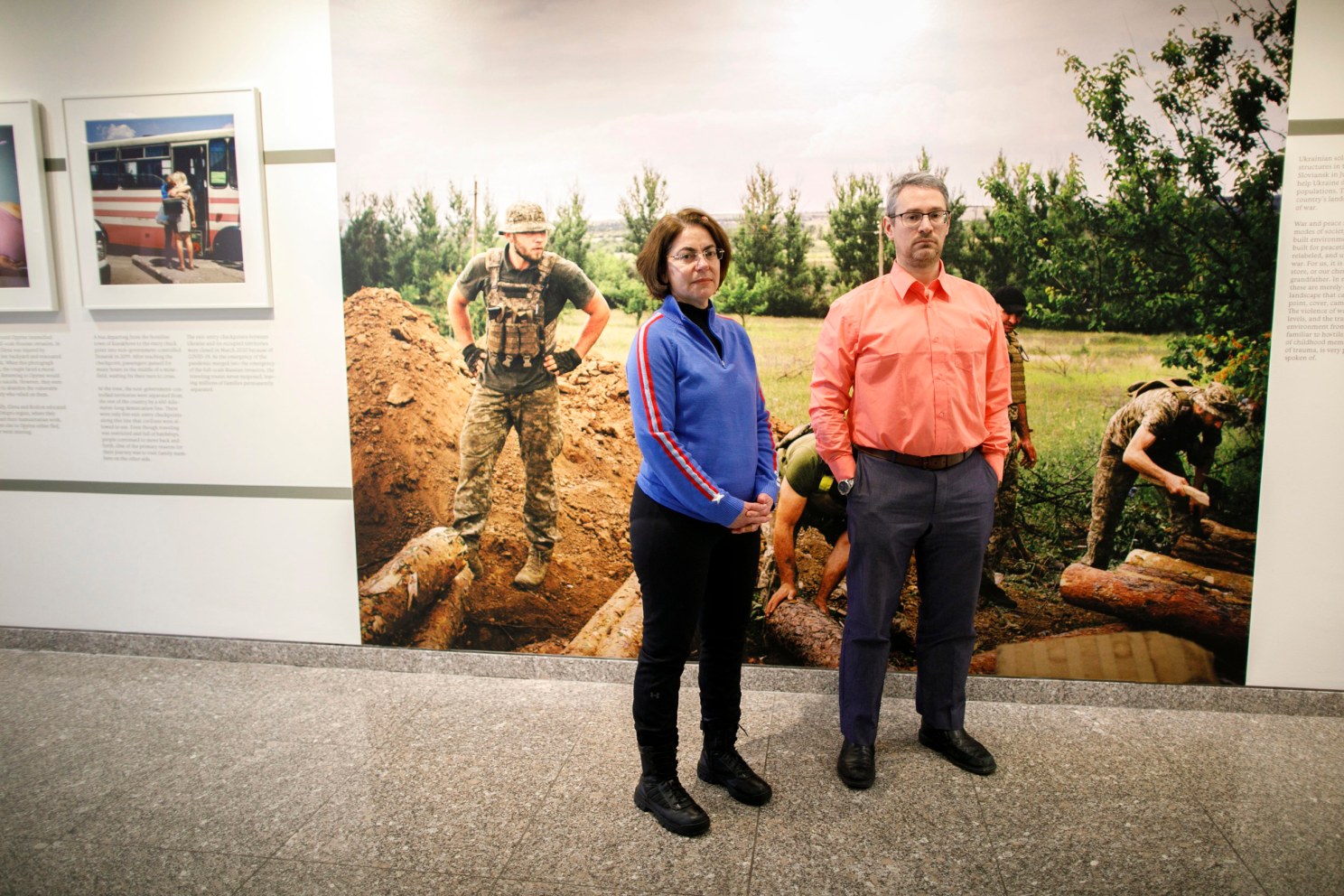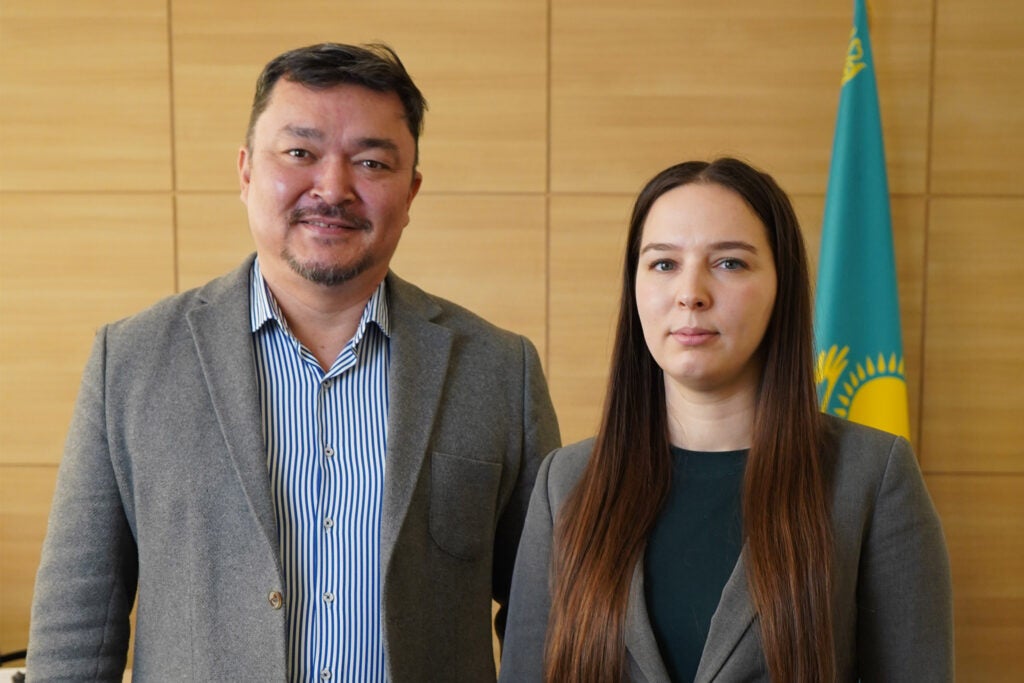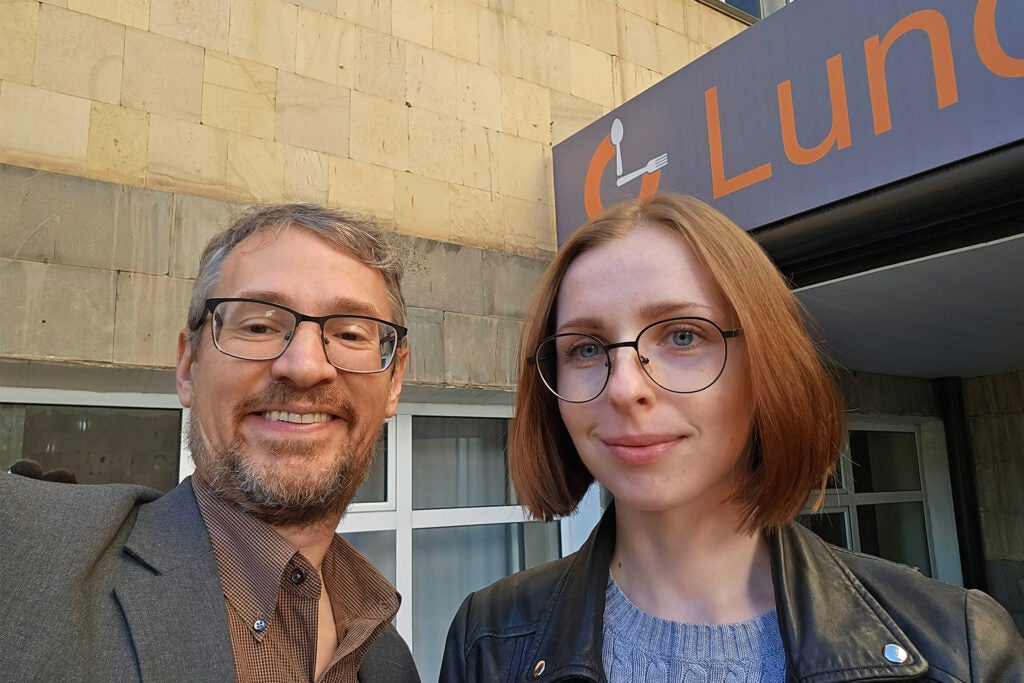Helping scholars upended by Russia-Ukraine war

Alexandra Vacroux, executive director of Harvard’s Davis Center for Russian and Eurasian Studies (left), and Daniel Epstein, assistant director, stand in front of a photo of the Donbas region of eastern Ukraine on view at the CGIS South Building.
Stephanie Mitchell/Harvard Staff Photographer
Davis Center’s Scholars Without Borders provides networking support, professional development to exiles, those living under siege
Leaving Russia meant leaving a hard-won job in academia.
But economist Daria Saitova, a population and family policy specialist, no longer felt safe or particularly free in her role as a researcher and associate professor at Ural Federal University in Yekaterinburg. She and her husband quietly sold their house and cars. Eight months after Russia’s invasion of Ukraine in 2022, they left for neighboring Kazakhstan.
“It was a totally new country for us,” Saitova said recently over Zoom. “We didn’t have any friends, relatives, or professional connections.”
Russia’s attack left many other scholars feeling the need to make similar difficult decisions. “A lot of the academics we work with have chosen to leave Russia,” said Alexandra Vacroux, Ph.D. ’05, executive director of Harvard’s Davis Center for Russian and Eurasian Studies. “Or they’re in Ukraine and saw their universities blown up or occupied.”
The Davis Center’s Scholars Without Borders initiative took shape within months of the invasion, forged from a desire to help academics like Saitova rebuild their lives and careers. The program leverages Harvard’s connections and resources to provide networking support and professional development opportunities to displaced academics from Ukraine, Belarus, and Russia.
“It was a totally new country for us. We didn’t have any friends, relatives, or professional connections.”
Daria Saitova

Vacroux, herself the granddaughter of Russian exiles, referred to the program as “one of my babies” and expressed great satisfaction over its impact. “We could be sitting here and reading the news and feeling like there’s nothing we can do,” she said. “This makes us feel we can do something. It really brings meaning to our response to the war.”
In late 2022, the Davis Center partnered with Harvard’s Ukrainian Research Institute and Association for Slavic, East European, and Eurasian Studies to survey scholars affected by the war. More than 300 Ukrainian scholars responded to one in the Ukrainian language, describing universities that had been occupied, damaged, or outright destroyed.
Nearly 3,000 others answered a Russian-language survey. About half were still in Russia, but most were planning to leave, Vacroux reported. “The other half had already left and were dispersed from Argentina to Thailand, though they were largely clustered in the former Soviet space.”
The findings inspired the creation of a Telegram channel, currently with 1,000 subscribers. “If we hear of a grant opportunity for biologists in, say, Armenia or Finland, we can advertise it there,” Vacroux said.
That simple strategy proved a lifeline to Saitova, who spotted an early post soliciting CVs from those resettled in Kazakhstan. Davis Center administrators quickly matched her with Eurasian Technological University in Almaty, the country’s largest city.
At her job interview, Saitova pitched the school’s leadership on launching an entirely new program. She was named a dean last February and promoted months later to vice rector of science and foreign affairs.
“The leaders here are interested in new ideas,” Saitova said of her new employer. “They are interested in new projects.”
Last year, Scholars Without Borders evolved to incorporate hands-on outreach, with varied approaches tailored to the needs of different populations. “In the case of the Russians and Belarussians, they’ve been severed from their institutions,” Vacroux explained. “They no longer have an affiliation; they don’t have access to library resources. They’re really cut off from everything.”
For this group, in-person contact has proved essential. Vacroux and her staff, including a Scholars Without Borders coordinator based in the Georgian capital of Tbilisi, have traversed the former Soviet bloc to meet with and counsel exiles in various countries.
Biologist and food scientist Victoria Chirkova, who left St. Petersburg in March 2022 and now works at a research center in Armenia, had a chance to sit down with SWB assistant director Daniel Epstein ’99, Ph.D. ’08, when he visited Yerevan, the city where she now lives.
“I got very good moral support,” said Chirkova, who was also connected with a mentor to help apply to European Ph.D. programs. “It helped me see that I’m not alone; I’m not stupid. I can do something, and I will do it.”
Meanwhile, many scholars who remain in Ukraine are working under dire conditions. Vacroux, who met in person last summer with university rectors from the southern and eastern parts of the country, learned of Russian soldiers firing weapons on campus or hauling away computer servers containing student records. When an explosion breached the Kakhovka Dam last June, one institution saw its agricultural research facilities effectively drowned.
“What we’re trying to do for the Ukrainians is improve their integration with the international scholarly community.”
Daniel Epstein

“What we’re trying to do for the Ukrainians is improve their integration with the international scholarly community,” explained Epstein, who joined the SWB effort in June and is also a lecturer in Harvard’s Government Department. “That means helping people make contacts for future research collaborations, or perhaps joint panel proposals for future conferences.”
Uniting this group is an online lecture series featuring experts from around the world. A talk on Feb. 8 by Oxana Shevel, Ph.D. ’05, a Tufts University political science professor and Davis Center associate, explored the complicated politics of the Ukrainian Orthodox Church. From there, attendees dispersed to breakout rooms helmed by subfield specialists.
“The breakout rooms, in some ways, are the most important aspects of these talks,” offered Epstein, adding that self-exiled Russians and Belarussians are served by a separate SWB series. “That’s where people get to know each other and what they’re working on.”
Going forward, Vacroux intends to hone some of SWB’s offerings. For example, the Telegram channel is “not super-efficient,” she said, “because the humanists also get the call for biologists.” Once funding is secured, the center will implement a database that allows for more precise matching of scholars with openings in their fields.
Also underway are in-person workshops designed to help scholars impacted by the war win international grants or bolster their English skills. An additional pilot will link Ukrainians with nonresidency fellowships at American schools. “This solves one major problem for a lot of people,” Vacroux said, “which is library access.”
Meanwhile, a small set of SWB beneficiaries is already positioned to give back. Saitova, for one, has brought opportunities to the SWB community since her first day with Eurasian Technological, including a nonresident affiliation program, opportunities for visiting professorships, and even two full-time permanent faculty roles.
She also teamed up with a group of SWB scholars now living on three continents to research how migrants like themselves make fertility decisions and rebuild social capital in new lands.
“And now we need to help even more people,” Saitova said, “because they too have contributions to make.”




